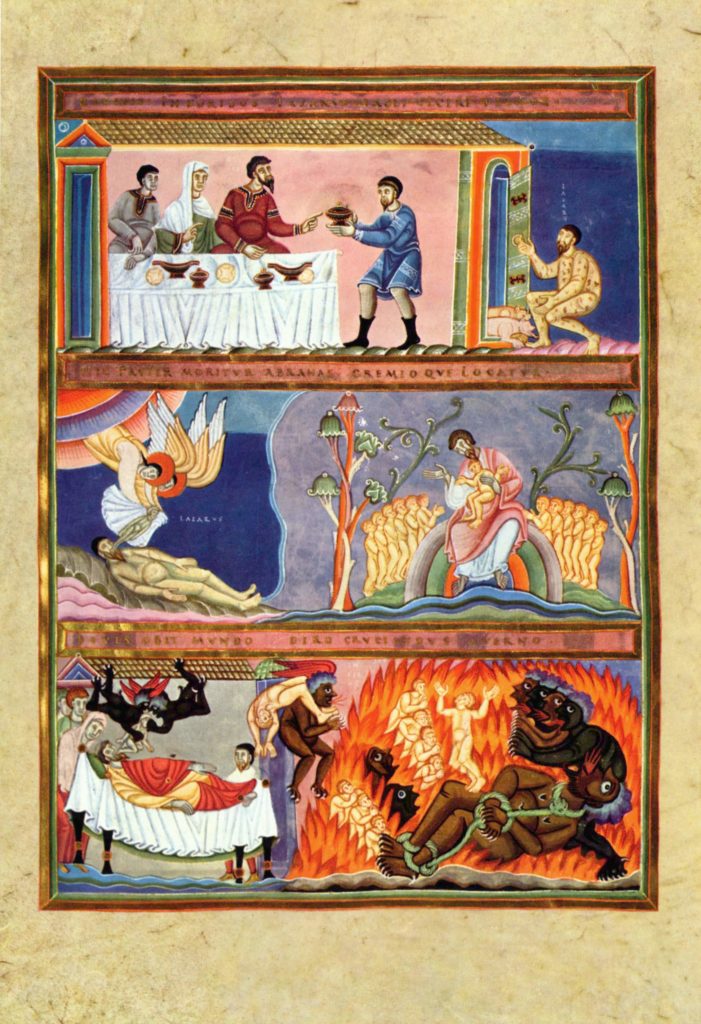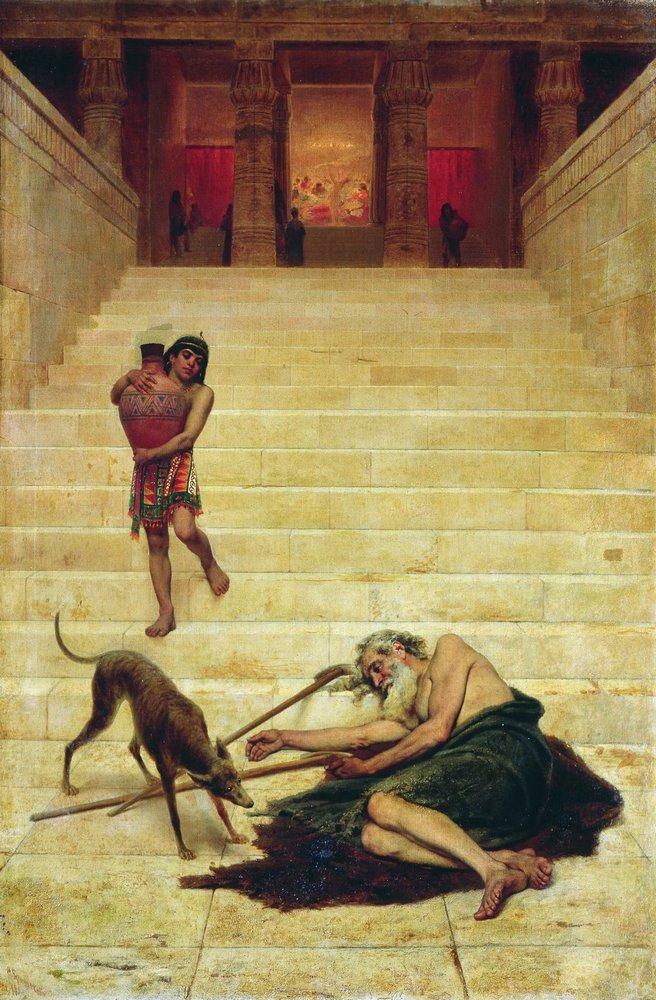Luke 16:19-31 | Nineteenth Sunday after Pentecost
Only one character has a name out of all of the parables that Jesus told, and his name is Lazarus. That is almost as remarkable as the fact that the miracle of raising the other Lazarus from the dead is only told in the Gospel of John; the synoptic gospels—Mark, Matthew and Luke—never mention it. That other Lazarus is raised from the dead, being four days in the grave, and it gets no mention. Yet here in Luke, the only place the parable of the rich man is told, the poor beggar gets the same name.
To be fair, in the oldest manuscript (P75) containing this story, the rich man is said to be known “by the name of Neues…” The Vulgate translation gave us ‘Dives’, but that simply means “rich man” and was not intended as a name. Elsewhere, the rich man is as nameless as the Pharaoh of Exodus.

Maybe the poor man is called Lazarus because there is a mention of resurrection: ‘If they do not listen to Moses and the prophets, neither will they be convinced even if someone rises from the dead.’ If there is a link between the Lazarus of John’s Gospel and this parable, it is tenuous.
Ironically, the main action of the story takes place after this Lazarus is dead.
The imagery of this parable contributes to our notions of heaven and hell. Of course, it is not clear that Lazarus and the rich man are in different places—they might be in the same overall place, a Hades something like the notion of the afterlife we find in Greek mythology but separated into different areas, like the dead who come to speak to the Greek hero Odysseus in Homer’s story. It could also be that the parable is describing heaven and hell after all, with the surprising aspect of making each visible from the other but divided by a chasm that cannot be crossed.
It is a mistake to take any of these details literally. As in any mythological tale or great story, the point is truth, not facts. (Facts may be true, but they are not truth, not the kind of truth that can make life worth living.) Abraham, the gate keeper figure of this parable, might have been Saint Peter had the parable been told a few centuries later—the role is the same as in later notional tales where Peter is the gatekeeper of heaven.
One oddity of the story is the lack of detail regarding why the rich man is condemned, and there’s a second oddity in the peculiar detail that is present:
But Abraham said, ‘Child, remember that during your lifetime you received your good things, and Lazarus in like manner evil things; but now he is comforted here, and you are in agony.’
Anyone who believes that wealth is a sign of God’s blessing and that poverty a sign of the lack of it, an idea that emerged early in Old Testament thought but one that the prophets thoroughly trashed and discarded (a theological trajectory of understanding moves through scripture), should hear a word of warning. We assume that the rich man’s offenses are self-absorption and a lack of compassion for Lazarus. What the Abraham character (and therefore Jesus) tells us is more straightforward but perplexing—the rich man received good things in his lifetime, but Lazarus only suffered. There is a sense of balance, but there is little that matches up with any expectations of a final judgment and of God’s justice. Still, there is one more aspect of the rich man’s life that is mentioned, and it may be the critical element of the entire parable. He did not believe.
The rich man’s response to God, or rather the lack of it, is the true basis for his present condition. In fact, it is because of this same indifference on the part of his brothers that the rich man begs Abraham to send Lazarus to warn them. Surely, the rich man says, they will believe if someone rises from the dead.
Here is the early kerygma of the Church, the proclamation of the resurrection of Jesus and the demand that faithful people respond to it. The demand is not simply to live a moral life, not to feed the hungry or help the poor: those are baseline behaviors expected of any decent person. The critical matter in the Christian proclamation is the response to the presence of God as witnessed in the resurrection of Jesus. Of course, anyone responding to such love in God would also respond to a poor man starving on the steps.
![Hendrick ter Brugghen [Public domain], via Wikimedia Commons](https://crtaylorbooks.com/wp-content/uploads/2016/09/Hendrick_ter_Brugghen_-_The_Rich_Man_and_the_Poor_Lazarus_-_Google_Art_Project-300x241.jpg)
Boundaries, chasms, and gates fill this story. The rich man reclines inside his walls, beyond his gates, unreachable by the beggar Lazarus who lies dying outside. Then the rich man is in torment inside the walls of death, outside the gateway of life, watched by Lazarus, who never speaks a word throughout the entire parable.
The other Lazarus of John’s Gospel lay dead inside a tomb, cut off by the dual obstacles of stone and of death. In that story, Jesus removed the stone, but he stood outside and called to Lazarus. What if that Lazarus had been like this rich man and all his brothers and refused to respond? What if Lazarus had closed his ears, refused to listen to the echo of Jesus’ voice reaching into the darkness of that tomb, calling him back to life?
We might wonder the same thing about ourselves. We might stop to listen, and go to see who is waiting outside the walls we have built.

